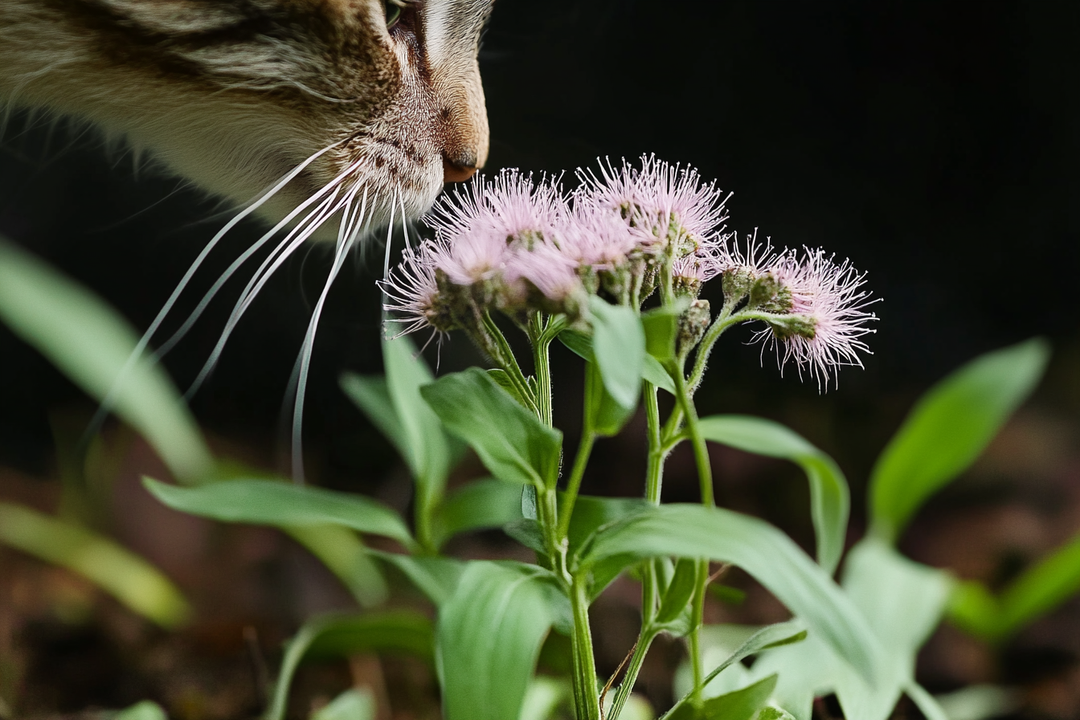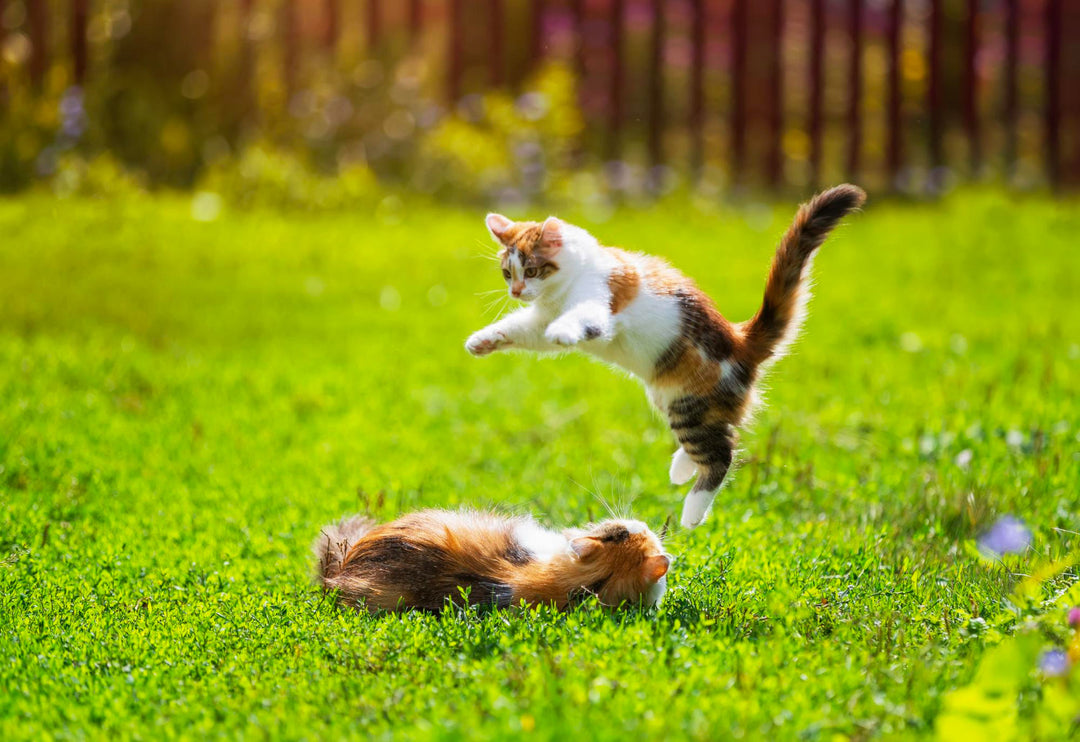What Does Catnip Do to Cats? Peace, Love, and Catnip Benefits Explained 🌼

Catnip — that magical, minty herb that turns even the funkiest cat into a total flower child. But what does it actually do to cats? Is Catnip safe for cats? Does it get them high? Can they eat it? And why do some cats seem to totally dig it while others just say, "nah, man"?
We're laying it all out for you, cool cats — read on to get hip to all things nip!
What is Catnip?
Catnip (Nepeta cataria) is a leafy green herb from the mint family, grooving naturally in parts of Europe, Asia, and North America. The real magic is in its oil, especially a compound called nepetalactone.
Nepetalactone interacts with the special receptors in your cat’s nose and triggers a funky, feel-good reaction in the brain — a lot like natural euphoria! 🌼
When cats sniff, lick, or roll in catnip, they experience a harmless, temporary burst of energy, silliness, and sensory overload. It's like a far-out party for their brain!
What Does Catnip Do to Cats?
When a cat encounters catnip, you might notice them:
-
Rolling around and rubbing their face into it
-
Zooming, flipping, or play-fighting invisible enemies
-
Purring, meowing, or drooling
-
Chilling out in a blissful, dazed state
This groovy response usually lasts about 10–15 minutes. After that, your cat enters a "catnip cooldown" where they're temporarily immune to its effects. (Far-out but true!) 😎
Not all cats react, though — sensitivity to catnip is genetic, and about 30% of cats just don't get the buzz. And kittens under 3–6 months usually haven't developed the right receptors yet.
Does Catnip Get Cats High?
Solid question! 🕺 In a sense, yes — but not like human substances.
Catnip affects the feline brain’s opioid receptors, releasing natural "feel-good" chemicals like endorphins. It's a totally natural, safe high that's closer to the buzz a human might get from laughing or exercising.
There’s no evidence that catnip is addictive or dangerous when used in moderation. It's just Mother Nature’s way of helping your cat get their groove on!
Can Cats Eat Catnip?
You dig it, we dig it — but can they eat it?
Absolutely! Eating catnip can have a calming effect instead of a hyper one. Instead of running wild, some cats who nibble on catnip might just mellow out into a total Zen master state. 🧘♂️
But remember, a little goes a long way! A tablespoon or less is plenty for one session.
Too much might cause a minor upset tummy — nothing serious, but it’s always best to supervise snack time.
Why Do Cats Like Catnip?
Scientists believe cats evolved to dig catnip because nepetalactone mimics natural pheromones. It basically flips their brain's "good vibes" switch.
Some theories even suggest that in the wild, the euphoric reaction helped wildcats relax or become more playful to bond with their family groups. (Talk about social butterflies! 🦋)
Fun fact: catnip might even have natural mosquito-repelling properties. When a cat rubs against catnip or silvervine (Actinidia polygama), the iridoid compounds left on their fur can help keep pesky bugs away!
Read more about Catnip Benefits.
Is Catnip Bad for Cats?
Not at all, daddio! 🕺
Catnip is considered completely safe for cats when used responsibly. It’s non-toxic, non-addictive, and generally causes no long-term effects.
However, like any good thing, moderation is the name of the game. Overexposure can lead to:
-
Mild digestive upset (nausea or diarrhea)
-
Temporary aggression in a small number of cats
-
Desensitization (where your cat stops reacting for a while)
Our advice? Offer catnip a few times a week rather than daily to keep the magic alive.
Can Cats Overdose on Catnip?
Don’t freak out — catnip overdoses are extremely rare and not life-threatening.
At worst, if your cat eats too much catnip, they might experience:
-
Vomiting
-
Diarrhea
-
Sleepiness
-
Mild irritability
If this happens, simply remove access to the herb and let your cat rest. Most bounce back quickly without needing a vet.
Still, if your cat seems seriously uncomfortable, it’s always a good idea to call your vet and get their read on it.
Can Kittens Have Catnip?
Groovy little kittens are still finding their flow!
Most kittens under 3 to 6 months old won't react to catnip yet because their neurological receptors aren't fully developed. If your tiny fur baby isn't impressed by your organic catnip stash, don't sweat it — they'll likely dig it once they're a little older.
If you're eager to start early, you can always try silvervine or valerian root — two other natural herbs known to jazz up even young cats! 🎸
Other Cool Alternatives: Silvervine and Valerian Root
If your cat isn’t vibing with catnip (or just wants to try something new), consider these other groovy herbs:
-
Silvervine: A climbing plant from Asia that can be even stronger than catnip for some cats. It brings out zoomies, playful wrestling, and pure good vibes.
-
Valerian Root: A root herb that has a slightly stinky smell to humans but cats go wild for it! Valerian often has a more mellowing, calming effect.
Mix and match different herbs to see what gets your cool cat groovin’! 🌼
Final Thoughts: Catnip = Natural Good Vibes for Your Feline Friend 🐾✨
Whether your cat flips, zooms, chills, or vibes out, catnip is a safe, natural way to enrich their world.
Sprinkle a little into their day and let your cool cat feel the peace, love, and purrs! 🌼🐾
And remember — for the ultimate Whisker Trip, always choose organic, high-quality catnip without additives or fillers. Your far-out feline deserves the best!














Leave a comment